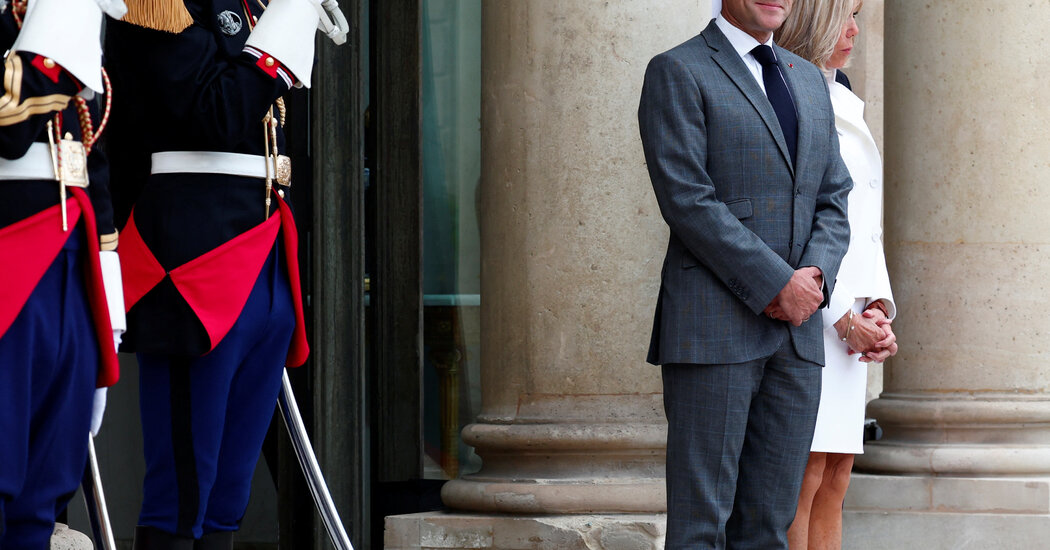As Macron rolls the dice, France holds its breath
Emmanuel Macron, the president of France, shocked his nation when he dissolved Parliament and called for a snap election after his party was trounced by the far right during European elections. On Sunday, voters head to the polls for the first round of voting as French politics reels.
For insight, my colleague Daniel Slotnik spoke with Roger Cohen, The Times’s Paris bureau chief.
What’s at stake?
Roger: Well, President Macron has taken a huge gamble. The immediate possibility is that the far-right National Rally could win a majority, or even an absolute majority, in the national Parliament. That would represent the end of a postwar absolute taboo in France against the far right attaining the highest offices of government.
Why would Macron call this vote after he was beaten soundly in the E.U. parliamentary elections?
Some think he may be calculating that if the National Rally enters government now, the party will be discredited by the 2027 presidential elections, because it’s much more difficult to govern than to rail from outside the gates of power.
Do you think it’s a sound strategy?
No. I think, first of all, it’s unnecessary. Second of all, it’s extremely high-risk. Third of all, the Olympics are about to start in less than three weeks, and all eyes will be on France. Fourth, it raises the possibility, if the far right does win, of violence in the streets, of protest, of chaos. So the fifth question is, is the president really ready for France to present an image of chaos when the Olympics begin?
Now, none of that may happen. But was it wise? Was it prudent? Was it rational? I don’t really think it was.
What do the French people think about this?
The general atmosphere here is one of consternation, bewilderment and tension, now mostly beneath the surface, with fears of violent demonstrations if the far right wins big.
What do you think is likely to happen?
I think the most likely outcome is a National Rally victory — with maybe a 20 percent chance that they win an absolute majority. But more likely they’ll just be by far the biggest party. Macron then faces a Parliament dominated by the National Rally, with a large far-left presence, and with his party and his relative power in Parliament much reduced.
For more on the French elections:
Biden and Trump’s first face-off of 2024
President Biden and Donald Trump will meet onstage for the first debate of the 2024 election. It starts at 9 p.m. Eastern (That’s 9 a.m. in Hong Kong, 11 a.m. in Sydney). This could be the most important moment of the campaign. Follow our live updates.
Biden will seek to prioritize abortion and the future of democracy. His team wants to nudge voters away from seeing 2024 as a vote on Biden’s leadership, and toward the idea that a second Trump term would be more radical and vengeful than the first.
Trump is keen to attack Biden’s record and his age (Biden is 81 and Trump is 78). Expect Trump to focus on immigration and inflation. Currently, he leads Biden by three percentage points, according to a Times/Siena College poll.
Iran holds a presidential election
Iran is holding a special election today to replace President Ebrahim Raisi, who was killed last month. Voters are showing little enthusiasm for any of the six candidates.
In the past, some Iranians boycotted elections to express frustration with the government. Even people who said they would vote in this election had little faith that their lives would change for the better.
“We have been going backward and we are crying inside,” a 53-year-old engineer said.
Arms: For the first time, some of Iran’s ruling elite have dropped their insistence that its nuclear program is for peaceful purposes and are talking openly about building the bomb.
MORE TOP NEWS
As the planet warmed, atoll nations like the Maldives were expected to vanish beneath the rising waves. But my colleague Raymond Zhong reports that scientists have begun to see something shocking: Some of these islands are growing.
CONVERSATION STARTERS
A NOTE TO OUR READERS
Stepping away and saying goodbye
Today is my last day writing the Asia Pacific morning briefing. On Monday, I will join our International desk to cover breaking news from London.
Writing this newsletter has been a great honor and a delightful challenge. I have learned so much from my colleagues and from you, our loyal readers. I’m grateful for your insightful, evocative emails. Thank you all for giving us a few minutes of your day, and thank you for engaging with our work. I know you will be in good hands moving forward.
Please reach out with any suggestions, story ideas or even London recommendations. My email is amelia.nierenberg@nytimes.com.
Thank you for your trust, and your readership.
RECOMMENDATIONS
Daniel E. Slotnik contributed reporting.
That’s it for today. Have a lovely weekend and a lovely rest of your year! — Amelia
You can reach our team at briefing@nytimes.com.














































